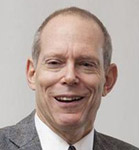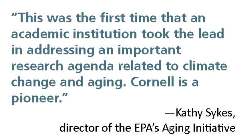Reprinted with permission from Cornell Chronicle, April 1, 2011

Cornell researchers are calling on their colleagues around the world to focus on how aging global populations will intersect with climate change and calls for environmental sustainability.
In the article published in April's Journal of Aging and Health, professor of human development Karl Pillemer and four Cornell colleagues argue that environmental threats disproportionally affect the health of the aging.
"These risks are likely to increase as the effects of climate change are felt," the authors write. "The older population is at greater risk for adverse health effects from extreme temperatures, susceptibility to disease, stresses on the food and water supply, and reduced ability to mobilize quickly."
In addition to being affected by climate change, aging populations also might shape environmental change.
Older people now drive more than use mass transit less than they used to; take more medications, which need to be disposed of safely; and as they age and restructure their living arrangements, their residential energy efficiency changes and their independent and assisted living facilities are often built in environmentally sensitive areas, write the authors.
Older people may provide solutions to environmental problems, the researchers state, through their involvement in environmental volunteerism.
As our population ages, "studying the connections between environmental sustainability and aging is potentially of great importance," say the researchers, who propose a research agenda to examine the intersection of aging and environmental sustainability.
However, they add, older persons may also provide solutions to environmental problems through their becoming involved environmental volunteerism.
Few scientific studies, however, have focused on how aging and environmental sustainability intersect. The article offers various recommended topics for future research, including environmental threats to the health of older people, pro-environmental behavior and volunteerism in later life, and environmental impact of housing and living arrangements.
The article stems from the 2009 Cornell Conference on Aging and the Environment, co-sponsored by what is now called the Atkinson Center for a Sustainable Future as part of its 2008 Academic Venture Fund program. The conference included experts from across Cornell, partner and peer organizations, national experts, and the Environmental Protection Agency, and the format encouraged the development of a research agenda through a "consensus workshop" model, designed by Pillemer.
Co-authors of the new article include Nancy Wells, associate professor of design and environmental analysis; Rhoda Meador, associate director of extension and outreach, College of Human Ecology, and of the Bronfenbrenner Life Course Center; Jennifer Parise, graduate student, human development; and Linda Wagenet, former senior extension associate in development sociology, College of Agriculture and Life Sciences; all at Cornell.


